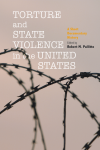Guest post by Robert M. Pallitto
One of the big questions in the media these days is whether torture should be used to interrogate terrorists and prevent future attacks. When I hear these discussions, I get the sense that we are facing this question for the first time in our post-9/11 world. Even the famous “ticking bomb” hypothetical, beloved by politicians and philosophers alike, is raised as something-we-might-have to-do-someday. You’ll recognize the case: Terrorist plants bomb that will go off in an hour. Millions will die. Terrorist is in custody and isn’t talking. Should interrogators use torture to find the bomb and save millions of lives? In this new and dangerous world, so the story goes, we might have to think hard about our opposition to torture.
After listening to this talk for some time, I began investigating the purported novelty of the torture question and I found a very different story. Torture has been with us since colonial times. In my recent research, I collected more than 100 government documents showing torture in colonial statutes, torture of slaves, torture in the Philippines and in Vietnam, and government-funded torture research. A profound ambivalence can be seen throughout. State actors know it’s wrong but find reasons to do it anyway. And this ambivalence echoes across four centuries.
There are very good reasons to oppose torture categorically, reasons both practical and moral. Torture doesn’t work. It can’t be contained once begun. It violates core principles of our political tradition. But in addition to exploring those reasons for saying “no” to torture, we should also examine our own history. When we realize what the U.S. has done rather than wondering about what we might do in the future, when we replace the hypothetical with the actual, we can see that we have been here before. Water torture in the Philippines did not save American lives, but it did generate a lot of anger and revulsion. President Roosevelt responded with simultaneous condemnation and justification in 1902 much like President Bush did in 2002. Contexts change, but arguments remain the same. The similarity of their responses suggests that we have learned little from our past.
This piece first appeared at Academic Minute. The podcast and original post are here.
 Robert M. Pallitto is a professor of political science at Seton Hall University, editor of Torture and State Violence in the United States, and coauthor of Presidential Secrecy and the Law, both published by Johns Hopkins.
Robert M. Pallitto is a professor of political science at Seton Hall University, editor of Torture and State Violence in the United States, and coauthor of Presidential Secrecy and the Law, both published by Johns Hopkins.
The views expressed in this guest post belong to the author and in no way reflect the official opinion of the Johns Hopkins University Press.